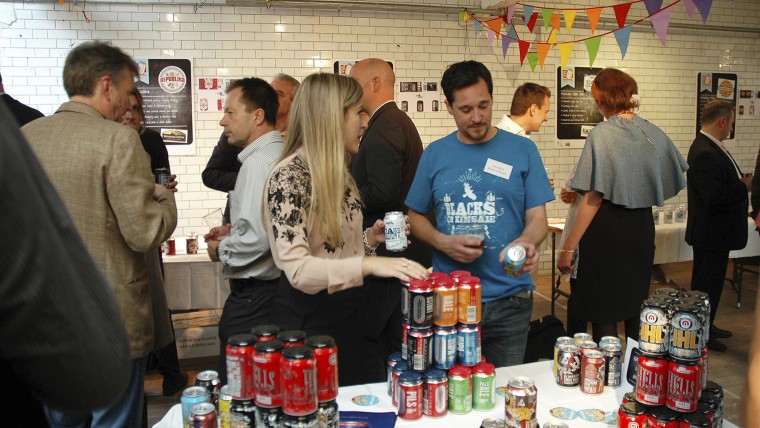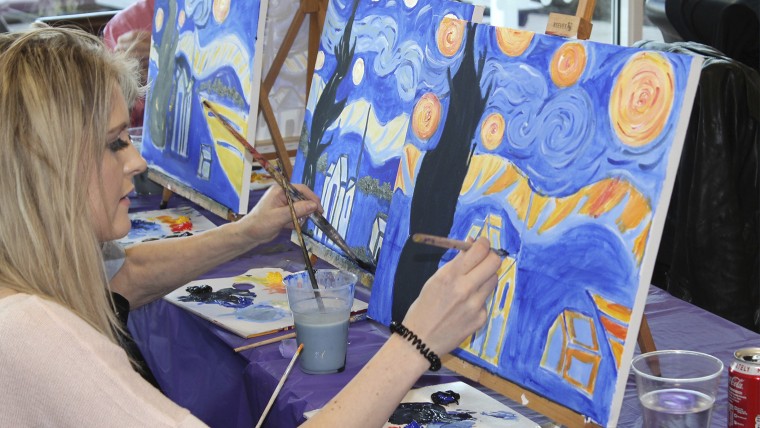Just over two years ago, Phyllissa Shelton, then a transformation consultant working within the NHS, heard about a franchise concept that was taking the United States by storm. As the name suggests, at a “paint-and-sip” event people gather together to enjoy a glass of wine or beer and to put brush to canvass under the tutelage of an artist.
Shortly after launching PopUp Painting & Events in the UK, Ms Shelton experienced a strong demand among businesses, as well as consumers, and now her corporate clients include Visa, RBS and law firm Linklaters.
“We’ll come to a client’s offices or take them to a venue, and set up our canvasses, brushes and paints,” she explains. “Then we’ll give people about two-and-a-half hours to enjoy a drink and unleash their creativity. One of our artists guides people through the basics and we usually follow the style of a certain painter. Banksy and Van Gough are the current favourites.”
In addition to being a medium to communicate with employees, corporate pop-up events are increasingly being used to engage with external audiences such as clients and suppliers
As well as team-building, the events allow participants to explore challenges and issues. “We’ll get them to draw or paint what the current situation looks like with all its difficulties, and then to paint the future and how they’d like it to look,” says Ms Shelton.
In addition to being a medium to communicate with employees, corporate pop-up events are increasingly being used to engage with external audiences such as clients and suppliers. In September, the Can Makers trade body held a pop-up beer festival, aimed at independent brewers, to promote the benefits of the can over other drink packages.
“The independent canned beer market in the UK was very small when this pop-up was envisioned,” says Martin Constable, chairman of the Can Makers. “We needed an event that would create an occasion, a talking point and a ‘call to action’ for craft brewers, industry suppliers, influencers and media to attend.

Brewers and guests mingle at the Indie Beer Can Festival
“A corporate event wouldn’t have produced the excitement we needed to reverberate throughout the whole market. When you think of a corporate event you think of auditoriums and suits, but the business customers in this case were the independent brewers. The industry they belong to is incredibly cool.”
Mr Constable believes the growth of business-to-business pop-ups has been influenced by the consumer pop-up sector. “In the end, buyers, whether they’re buying for a business or themselves, are still consumers and they still exhibit the same range of consumer emotions and reactions. The business-to-business sector is swiftly catching up with the consumer in terms of creativity and realising that a consumer marketing campaign can be adapted to suit their business needs,” he says.
Richard Dodgson, creative director at Timebased Events, whose clients include shopping centre group Westfield and Calvin Klein, says: “The pop-ups that have been successful have been original, enjoyable and well-conceived experiences. To emulate this success, the corporate market needs to consider the messages and purpose of their activity carefully, and ensure the experience they create captivates this in a fresh, sincere, but also fun and entertaining, manner.
“To get this right they really need to understand their audience. The best pop-ups also tend to be bold and brave. This is certainly something the corporate market can learn from – do things differently and break new ground.”
When Twinings tea were looking to create an impact among supermarket buyers, they approached 4D, a consultancy that creates “immersive experiences” through creativity, technology and design. For Twinings it was essential that the experience was very portable, quick to set up and provided maximum impact in a wide range of different venues. The solution was a giant inflatable pod where the audience could be transported through their senses to different tea-growing countries.
“For me it’s not just making a cup of tea with the right cups and saucers, it’s about being in the moment with the tea,” says Lucy Chappell, Twinings’ senior tea ambassador. “So what I wanted to create was a special experience for the customer I’m serving to be immersed in the world of the blend.”
According to Neil Crespin, creative director at mcm creative group, whose clients include Unilever, a well-executed pop-up experience can produce a far better “atmosphere for exchange” than a video or e-mail shot. “Some of the best pop-up activities have created a far less formal theatre for discussion, feedback and recommendation. Also by their very nature, a live event is a far more of a 360 experience than a video or e-mail communication,” he says.
“While there is a place to use both film and e-mail to communicate key messages to an internal audience, the power of a pop-up event allows a company to get closer. It offers the opportunity to spark important discussions and inspire a work force by creating memorable experiences.”

Cobham Curve pop-up painting event
Measuring feedback is also important and so mcm runs bespoke measurement models for each event. “It could be a simple iPad survey with pre-loaded multiple choice questions and areas of free text to gain the audiences’ thoughts and reactions immediately after their experience,” says Mr Crespin. “If we are cascading a tool kit or key strategic messages that can be tracked, we can measure the effectiveness of the road shows or pop-up events over a longer period of time and look at how many people participated in delivering against the key objectives outlined at the start.”
First launched in Australia, a2 Milk is a variety of pure cows’ milk that has been shown to be easier to digest. The brand has the endorsement of international rugby star Danny Cipriani. “We were confident that an opportunity to ‘pour a pint with Danny’ would be an appealing proposition for our key influencers,” says Scott Wotherspoon, chief executive of the a2 Milk Company. “We found a great little artisan café to take over and reskin into an a2 Milk ‘milk café’, open for one morning only.”
Mr Wotherspoon believes traditional corporate events don’t have the same sense of urgency. “Businesses should remember that stakeholders are also consumers,” he says. “A business message needn’t be delivered dry. Inviting guests to a pop-up, which is open for a limited time only, creates a sense of ‘miss it and miss out’, and is ideal for the brand and its guests to connect in a more enchanting way.”


